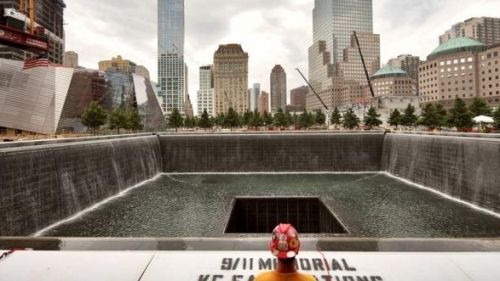On Solemn Day, Health of Survivors and Responders Remains a Concern

On a solemn day when President Barack Obama and former President George Bush commemorated tenth anniversary of the 9/11 attacks at the World Trade Center site, the work ahead to attend to the health of the people who became ill as a result continues.
The suicide attacks involving jetliners claimed nearly 3000 lives in total at the World Trade Center Site in New York, the Pentagon near Washington and in a rural town in Pennsylvania where one hijacked plane crashed.
On Friday, the top U.S. federal health official, Kathleen Sebelius commemorated the attacks remembering the “victims of this horrific day who are gone, but not forgotten.”
Story: 9/11 Healing: Study Tackles Challenge of PTSD
The Department she heads as part of the Obama Administration was not spared.
Dr. Paul Ambrose, young doctor who had just completed work on a “landmark obesity report” was a senior advisor to the U.S. Surgeon General on the day he died on flight 77, the plane that crashed into the Pentagon.
Sebelius also noted that more than 2000 current and former members of the U.S. Department of Health & Human Services responded on 9/11 and the days that followed.
“We remain grateful for their selfless work and the work of all those who served our country in the wake of the attacks,” she said.
The country’s most recent major legislative effort to aid victims of the attack by providing health services is the James Zadroga 9/11 Health and Compensation Act, which has allowed the Department to provide care for first responders.
Another program within the Department is the World Trade Center Health Program, which recently appointed a 15-member panel of scientific and technical advisors that will “gather data and make recommendations on how to best care for those in the program.”
The WTC Health Program provides medical monitoring and treatment of WTC responders and survivors for health conditions related to exposures experienced as a result of the attacks.
Yet concern remains that not all needs are being properly addressed.
Firefighters at the site of the attacks who have developed cancer are currently not covered by the federal government. Results of a recent cancer study of firefighters prompted federal lawmakers and advocates to call for treatment for the illness.
A peer-reviewed study conducted by the New York City Fire Department that was published in The Lancet recently found an elevated risk of cancers among firefighters who served at ground zero compared to the general population, and also an increase in cancer for those exposed to toxins at the site and those who weren’t.
Among the conditions the firefighters developed were melanoma, thyroid and prostate cancer, and non-Hodgkin’s lymphoma.
In light of the study a group of New York lawmakers and advocates asked the administrator of WTC Health program last week to consider whether or not to add coverage for cancers under current health coverage being provided.
The administrator of the program has 60 days to consider the petition.
Published by Medicaldaily.com



























